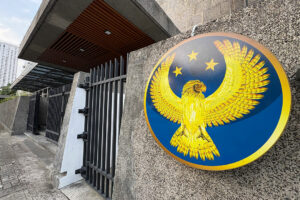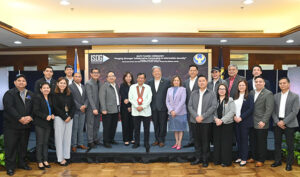By Luisa Maria Jacinta C. Jocson, Senior Reporter
CENTRAL BANKS must remain a “stabilizing force” amid uncertainties in the global economy, the Bank for International Settlements (BIS) said.
“The most important task, particularly in these highly uncertain times, is for central banks to be a stabilizing force and maintain or, in some cases, rebuild trust in monetary policymaking,” BIS Deputy Head of the Monetary and Economic Department Frank Smets told BusinessWorld in a virtual interview.
This kind of trust creates positive dynamics, he added, which helps stabilize inflation expectations and maintain price stability.
“What this means for actual actions of central banks will be different across countries,” Mr. Smets said.
“For countries like the Philippines or countries in East Asia that are on the receiving end of the US tariffs, the rise in tariffs is more likely to be a negative demand shock.”
Markets have been rattled these past few months amid the United States’ flip-flopping tariff policies.
US President Donald J. Trump has set a 19% tariff on Philippine goods, which will take effect starting Aug. 7.
Countries like the Philippines could see falling demand for exports, which could lead to disinflationary pressures, particularly from lower commodity prices, Mr. Smets said.
“In those countries, the room for easing monetary policy is probably greater. It’s really a differentiated picture depending on the country.”
The Bangko Sentral ng Pilipinas (BSP) has said the impact of the US tariffs on the Philippines will be “modest” as the country is not a trading economy.
The central bank is currently in the midst of an easing cycle, so far lowering interest rates by a total of 125 basis points (bps) since August last year.
BSP Governor Eli M. Remolona, Jr. has also signaled the possibility of further easing this year despite these tariff policies.
“Whether the country retaliates or not will have an important impact on the likely inflation effects. But the most important thing for central banks is to stay steady and be a force of stability rather than uncertainty,” Mr. Smets said.
“Heightened policy uncertainty and unpredictability, particularly in the US, is putting the soft landing that we had expected until the beginning of this year into jeopardy.”
In its latest Annual Economic Report, BIS said consensus forecasts show global growth at just 2.7% in 2025. This was slightly lower than the above 3% forecast at the beginning of the year, Mr. Smets pointed out.
“A big part of the discussion is what are the effects of this trade policy uncertainty on the global economy,” he said.
“It’s clear that this heightened uncertainty, not only on trade policy, but also on fiscal policy, migration policy, and central bank independence, has affected the growth outlook.”
Central banks must “deal with the immediate fallout while keeping top of mind the deeper, structural weaknesses that threaten the resilience of the global economy,” according to the report.
“Success will depend on maintaining public trust — trust in central banks’ capacity to act and do so in the public interest. Trust in their commitment to low inflation was decisive in quelling pandemic-era inflation.”
“Now, trust in public institutions — including the trust in money — needs to serve as a fixed point for others to rally around.”
SYSTEM FOR THE FUTUREMeanwhile, the BIS in its report also highlighted the need to build a monetary and financial system for the future.
“We should maintain the benefits of the current system, the two-tiered monetary system that we have, while enabling the new technologies to improve it,” Mr. Smets said.
The BIS proposed a “trilogy” of tokenization, namely, tokenized central bank reserves, tokenized bank deposits and tokenized government bonds, which will all reside on a unified or interoperable ledger.
“Tokenized central bank reserves would ensure what we call the singleness of money, because the settlement at par really happens on the central bank’s balance sheet,” he said.
Bringing commercial bank deposits into tokenization would also help maintain the elasticity of money. “Firms that expected to be hit by the tariffs and therefore anticipated a future need of working capital have increased their credit lines with the banks quite dramatically.”
“A well-working banking system can do that and thereby avoid gridlocks in liquidity. By bringing the commercial bank deposits into this tokenized world, this elasticity would be maintained.”
“Finally, we also suggest that other assets, and particularly government bonds, could be tokenized on the same platform. This would, for example, allow collateral management, including for central bank operations, to be automated on one ledger.”
Mr. Smets also noted Project Nexus, where the BSP is one of the five central bank partners in the region that established the Nexus Scheme Organisation, which will manage the project in its live implementation stage.
“The project aims at enhancing cross-border payments by linking domestic instant payment systems. That’s one example of where central banks get together and try to solve a real issue, which is international payments.”
This would also mark the BIS’ first Innovation Hub project that will be put into live implementation, Mr. Smets added.
The BSP earlier said it is seeking to strengthen collaboration on regional payment connectivity to foster a more inclusive financial ecosystem by enabling fast, seamless, and cheaper cross-border payments across the region.
“On the issue of the future monetary system, central banks must play a catalytic role. They can articulate their vision of the future monetary system to provide a guidepost for all stakeholders,” Mr. Smets added.
Meanwhile, he also noted the importance of developing and deepening local financial markets.
“That remains a priority. Authorities, including in the Philippines, continue to implement reforms to ease market access for borrowers and investors and lower transaction costs. This has resulted in the inclusion of bonds from several Asian economies in global bond indices.”
The Philippine government has been seeking ways to deepen its capital markets. The BSP has been working to enhance the interest rate swap market and the government securities repo market to improve benchmarks for a smoother yield curve.
“Developing the domestic financial system is a step in the right direction, but it’s not a panacea as you also increase the integration with the global investor community and the interconnectedness with global financial conditions,” Mr. Smets said.
“But for the real economy, this is definitely a good development. More generally, the region’s resilience, which has been shown in the response to the pandemic crisis, has been enhanced by reforms made during recent decades.”
These reforms include an increase in banks’ capital and liquidity buffers, implementing adequate loan loss provisions for banks and growing levels of foreign exchange (FX) reserves.
“The high level of FX reserves in Asia has helped resilience in response to some of the stresses. The strengthening of monetary policy frameworks has also helped the effectiveness of the monetary policy response,” he said.
“And then, finally, also the active use of macroprudential measures and capital market liberalization efforts. The theme here is that many of the good reforms that many countries in the region have implemented over the past years continue to be important.”

















